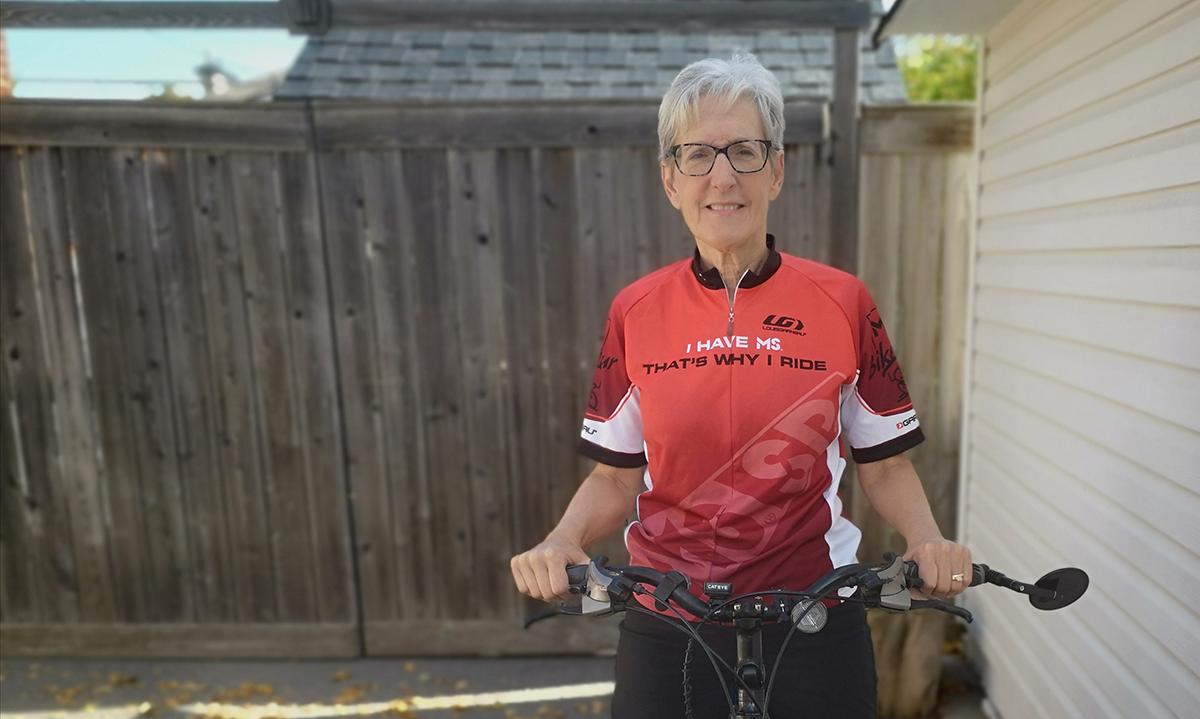 High Achievers
High Achievers
By Martin Cleary
Shortly after being diagnosed with Multiple Sclerosis, Cat Leroux of Ottawa learned about the MS Bike Tour. That was 30 years ago, and she has never missed participating in the two-day marathon to raise money and awareness about MS
In the course of cycling to work in downtown Ottawa, Cat Leroux would use the pathways paralleling the Sir John A. Macdonald Parkway, along the Ottawa River.
Between the start of April and the end of October, the faces became familiar and there would be quiet recognition — a nod, a smile, a wave — or sometimes the occasional word.
But one day 30 years ago, a gentleman said hello and asked her to stop for a minute. What could have been an awkward moment transformed into an awesome meeting that was meant to be.
“I literally had just been diagnosed with MS (Multiple Sclerosis) and I was quite upset. I was working and trying to deal with it,” Leroux, 66, said, recalling that meaningful day in her life.
“I biked to work every day and one fellow stopped me. He asked me if I knew about the (PwC MS Bike — Ottawa to Cornwall) tour and handed me a brochure.”
“I burst into tears (reading the brochure). The poor guy. He was probably thinking: ‘Who’s this looney tunes?’ I thanked him and said I’ll look into it. I have no idea if I ever would have known about it. I knew nothing at that point.”
Leroux was an avid cyclist and the idea of entering a twoday, marathon fundraising bike event was something close to her heart. It was overwhelming on one hand and so logical on another. She immediately registered to ride in Ottawa’s first MS Bike event in 1990 and she hasn’t missed a single one since.
That’s 30 consecutive Ottawa MS Bike tours and each one covered between 150 and 200 kilometres in total, taking riders from Ottawa to Cornwall the first day and a return trip the second day. The route has changed over the years, as riders have travelled to Kemptville in the past, and this year started in Metcalfe. There are plans to revamp the course for 2020.
The 2019 edition of the ride attracted 61 teams and 458 participants, which also included dedicated riders Mark Bazerman and Deana Schildcraut, who have kept pace with Leroux at 30 consecutive Ottawa MS Bike tours.
While it gets more difficult every year to do the proper training and complete the ride, Leroux loves the journey because this is her cause. And she proudly wears her t-shirt, which says: I Have MS. That’s Why I Ride. She has shared the experience with her common-law husband Brian for the past 13 years and her Chain Gan teammates. In the past, she made the trek with younger son Mike for 15 years and Alex for seven years.
“It’s true to my heart,” said Leroux, who was diagnosed with MS at age 36, but considers herself “a lucky one,” when it comes to living with the autoimmune disease of the central nervous system that damages the myelin, which is the protective cover for the nerves. “My girlfriend’s daughter has MS and I’ve seen the struggles.”
“We want to find a cure and do the research so people can get the equipment to live a more normal life.”
Her first bike tour was as emotional as it was physical.
“I remember sitting on the grass and crying. I met so many great people. The first tour was so important to me,” said Leroux, who responded by writing a letter to the Eastern Ontario office of the MS Society of Canada and asking how she could volunteer.
For the next six years, she not only rode the tour, but also sat on the organizing committee, including four years as its chair.
“It’s fun. I meet new people all the time. It’s an event that pushes you physically, but gives you a high emotionally,” she added.
There are 20 MS Bike events across Canada. The Ottawa tour is the regional chapter’s largest fundraiser and has raised more than $509,000 this year.
Canada has one of the highest rates of MS in the world and more than 77,000 live with it. Women are three times more likely to be diagnosed with MS than men.
There is no cure for MS and it’s unpredictable. The symptoms range from extreme fatigue to lack of coordination to weakness to tingling to impaired sensation to vision problems to bladder issues to cognitive impairment to mood changes.
For Leroux, MS presented itself in the form of vision difficulties. At age 32, she returned home from work one day and suddenly couldn’t see from her right eye. A massive black line partially blocked her vision. She went hysterical. She thought she had the ‘flu.
By the next morning, she had lost most of her sight in that eye. She couldn’t see colour and had no peripheral vision. Doctors put her through a series of eye tests and thought it was a virus. There was no mention of MS.
Nine months later, vision returned to her right eye and there was no permanent damage. But four years later, Leroux felt fatigued and figured it was caused by work, a young family and “trying to do everything.”
When she started to lose vision in her left eye, she visited numerous eye doctors and all test results confirmed she had MS at 36. Sixty per cent of adults are diagnosed with MS between the ages of 20 and 49.
Leroux refused to take any prescribed medications. Shortly after she was diagnosed with MS, her left-eye vision started improving. Within two months, her sight had returned to normal.
“I will always have MS. A second MRI, which was done at age 51 and 15 years after the first MRI, showed no change (in her MS) and that’s very encouraging. The most I get is tiredness,” said Leroux, an upbeat individual who retired after working 25 years with the Workplace Safety Insurance Board and home-schools her California-based grandson Malcolm, in grade seven social studies via Skype.
“I was a lucky one. That’s why I do the Bike Tour — to raise awareness, to donate money and to find a cure and research.”
Martin Cleary has written about amateur sports as a sportswriter for more than 44 years. This bi-weekly High Achievers column concentrates on athletes, teams and builders from Olympians to Little League Baseball players. Martin won the Doug Gilbert Medal as Canada’s sportswriter of the year in 1983.






